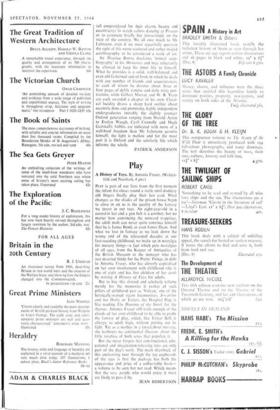Play
A History of Toys. By Antonia Fraser. (Weiden- feld and Nicolson, 4 gns.)
PLAY is part of our lives from the first moment the infant fist closes round a rattle until doddery old fingers finally play their last card. What changes as the shades of the prison house begin to close in on us is the quality of the fantasy we invest in our toys. An eight-year-old in a coonskin hat and a gun belt is a cowboy, but no matter how convincing the outward trappings, the adult male can never quite convince himself that he is James Bond, or even James Dean. And what we lose in fantasy as we look down the wrong end of the telescoped decades at our fast-receding childhood, we make up in nostalgia for nursery things—a fact which puts nostalgics of all ages, from the Keeper of Antiquities at the British Museum to the teenager who has just deserted Sindy for the Pretty Things, in debt to Antonia Fraser, who has cleverly capitalised on her own involvement with childhood (she is one of eight and has five children of her own) by writing A History of Toys for adults.
But to buy this shrewd and scholarly volume merely for the memories it evokes of such pillars of childhood past as 'Vulcan,' one of the heroically-named steam locomotives; Josephine and her Dolls; or Tatters, the Hospital Pup, is like reading The Hunting of the Snatk for the rhymes. Antonia Fraser still trails enough of the clouds of her own childhood to be able to probe the fantasy of play, which, like Tinker Bell, is allergic to adult logic, without putting out its light. Yet as a mother in a knockabout nursery, she harbours no sentimental illusions about the little toughies of both sexes that populate it.
But she never forgets that constructional, edu- cational and imagination-releasing toys are only part of the day's work. The main drawback of this enchanting tour through the toy cupboards of the ages is that the package has both the appearance and price of a coffee-table book— a volume to be seen but not read. Which means that the very people who would enjoy it most are likely to pass it by.
JEAN ROBERTSON














































 Previous page
Previous page